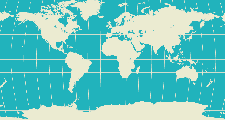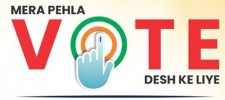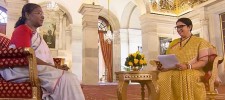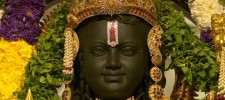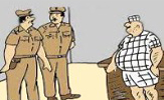US PRESIDENTIAL CANDIDATES
डेव मक्कड़

America is the only country where to select the Presidential candidate by both parties; election campaigns kicks off every 2 years before the actual election for the so called 4 year Presidential term. After 1 year of campaigning with some time initially almost a dozen candidates in both parties; the caucuses and primary elections/voting starts in January and ends in July-August for all the 50 states. Then the front runners goes to their party’s national convention to be nominated formally as the Presidential Candidate of their Party in August or September for the party of sitting President. Sometimes it can be a brokered convention when there is no clear front runner with the required number of delegates as stipulated by their party to be their Party’s Presidential Candidate. Then the Candidate is decided by the Super Delegates or un-pledged delegates. The most unfortunate thing is if a sitting President is also in the race for re-election, they become the Campaigning President for their Party for their remaining term of 2 years rather than President of America working for solutions to the problems of their fellow Americans.
A common misconception about the primary election process is that votes are cast directly for candidates. In reality, votes are cast in favor of the delegates in respective states using caucuses or general voting. These elected delegates or pledged delegates represent the candidates at their respective party’s national conventions where they vote to select the party’s presidential nominee along with un-pledged delegates called super delegates of their party. America which is called the oldest Democracy and world Super Power do not have uniform Rules for its Presidential Primaries. All 50 states have different rules for Caucuses, primary elections and rules for awarding delegates.
Caucus & Number of Caucus States
Nineteen states and the District of Columbia utilize the caucus system for either or both political parties. Caucuses are simply meetings, open to all registered voters of the party, at which delegates to the party's national convention are selected. When the caucus begins, the voters in attendance divide themselves into groups according to the candidate they support. The undecided voters congregate into their own group and prepare to be "courted" by supporters of other candidates. Voters in each group are then invited to give speeches supporting their candidate and trying to persuade others to join their group. At the end of the caucus, party organizers count the voters in each candidate's group and calculate how many delegates to the county convention each candidate has won. As in the primaries, the caucus process can produce both pledged and unpledged convention delegates, depending on the party rules of the various states.
Number of Primary States
30 States use the primary system of Primaries generally take on one of four forms: open (voters can belong to any party, or none at all), closed (voters are party members only), semi-open (voters are either registered party members or unaffiliated) and semi-closed (voters are able to vote with the political party they currently want to be affiliated with); with the open primary being the most prevalent. New Hampshire presidential primaries are open to independent voters and closed for Republicans and Democrats.
How Delegates are Awarded
The state Democratic and Republican parties use different methods for determining how many delegates are awarded to, or "pledged" to vote for the various candidates at their national conventions. Democrats use a proportional method. Each candidate is awarded a number of delegates in proportion to their support in the state caucuses or the number of primary votes they won. In the Republican Party, each state chooses either the proportional method or a "winner-take-all" method of awarding delegates. Under the winner-take-all method, the candidate getting the most votes from a state's caucus or primary gets all of that state's delegates at the national convention.
Number of Delegates needed for Party nomination
For Republican as well as Democrat Party nomination one needs a simple majority out of the ever changing number of required delegates. In 2004 Republican Party’s total delegates were 2,509, in 2008 it was 2,380 and for 2012 the number is 2286 with 117 Super delegates and to win the nomination one needs 1,144 delegates. Democrat Party use a base of 3,700 pledged delegates in each election cycle. For 2008 these numbers were 3409.5 state delegates elected after caucuses and primaries and 823.5 Super delegates; number of delegates needed for party nomination was 2,117. For 2012 convention the pledged delegates are going to be 5,000 besides over 825 Super delegates or un-pledged delegates.
Two states more equal, among 50 equal states; Iowa and New Hampshire holds nations first Caucus and Primary in January of the election year since 1920’s that influence the selection process for the selection of Candidates by both parties. These two small, heavily white, 40% rural states have more authority on the making of the president. Together, Iowa and New Hampshire is a mere 1.4 percent of the US population. Then their average population of African Americans, Hispanics/Latinos and Asians is 3.6 percent, while the nation as a whole is 35 percent minority.
In most recent Presidential primaries, the nominations have been all but decided by the first few weeks of voting, leaving large majorities of voters and states effectively disenfranchised. Within few days of Iowa Caucus; New Hampshire, Wyoming, Michigan, Nevada, South Carolina, Florida, Main hold their caucuses/primaries. Super Tuesday in February or March first week with primaries/Caucuses held in more than a dozen states of America.
Tennessee Senator William (Bill) Brock once said in Detroit News something about front-loading; "Today, too many people in too many states have no voice in the election of our major party nominees. For them, the nominations are over before they have begun.
In 2000, for example, both Vice President Al Gore (D) and Governor George W. Bush (R) both had clinched their party’s respective nomination before thirty-three states, including many of the largest, had even voted. Also in 2000 when both parties had multi candidates running for the presidency—a mere 17.7 percent was the voter turnout for both parties combine and all states combine. This is a miserable showing and clearly reflects America’s main street’s has no confidence in the present system of caucuses and primaries manipulated by both political parties with corporate and foreign money.
Americans are brain washed rather tortured to watch very expensive, lavish and vulgar campaigns with performers from the minority Unionized Elite Club running America in the name of Presidential Primaries for 18 months. Besides Candidates spending millions directly raised by them from personal fortunes and supporters; millions of dollars are spend by outside groups — particularly super PACs (Political Action Committees) openly funded by billionaires that have few limits on their activities and has been dominating the presidential contest for more than 3 decades. Sometimes cash infusion by these billionaires is more about knocking down a particular candidate rather than making sure their own candidate winning the primary. Current example is casino mogul billionaire Sheldon Adelson who has sunk in millions in Winning Our Future, a super PAC supporting Newt Gingrich who has no chance of winning the nomination; to make sure Rick Santorum does not get the Republican Party nomination.
Sincethe last 2 election cycle a new entrant to the presidential campaign funding are nonprofit groups that never have to reveal their donors, suggesting that a significant portion of the 2012 elections will be wrapped in a vast cloak of secrecy. Millions of dollars are spent on mostly negative ads against their opponents from their own party like in this election cycle Romney put in more than 19,800 TV ads against 4,100 TV ads put by his nearest rival Newt Gingrich in one state Florida only. Romney spent more than $9 million and his super PAC’s spent another $10 million in Florida primaries.
Millions of dollars are spent by political campaigns to hire consultants to write speeches, produce ads, run polling and perform other specialized work including paid mysterious strategic consulting. As usual with all such vendors no information is ever revealed about salaries or other internal costs. Then 10-15% money raised by candidates directly or from super PAC’s goes to “Fundraising Consultants” as fee for raising funds for the candidate or advising the candidate how to raise funds. This arrangement not only benefits several of those close to the Candidate but also makes it harder to determine how they are spending their donors’ money, because salaries and other details about outside operations are kept under wraps.
In June 2011, Democrat John Edwards 2008 Presidential Candidate and 2004 Vice President Candidate was indicted by a North Carolina grand jury on six felony charges, including four counts of collecting illegal campaign contributions, one count of conspiracy and one count of making false statements. United States Department of Justice conducted a 2 years investigation into whether Edward used more than $1 million in political donations to hide his extra marital affair and fathering a child with her Campaign consultant Reille Hunter. Tentatively Edward trial is scheduled for March 2012 if convicted, Edwards’s faces up to 30 years in prison and a $1.5 million fine.
Republican Vice Presidential Candidate Sarah Palin’s wardrobe with expensive clothing from high-end stores for over $150,000.00 paid by Republican National Party classified as “Campaign accessories” became the symbol of political excesses in 2008. Senator Hillary Clinton said that campaign money was never spent on personal clothing but that potentially embarrassing purchases could be blended into advertising budgets.
America is the only democracy that does not have a spending limit on Presidential candidates in Primaries as well as in general election. The 2008 campaign was the costliest in history, with a record-shattering $5.3 billion in spending by candidates, political parties, super PAC’s and nonprofit groups on the congressional and presidential races. In the 2008 President Obama alone spent almost a billion dollar that include over $650 million raised by him and rest spent by his super PAC’s and nonprofit groups. In April 2011 President Obama’s Campaign Manager gave a statement they plan to raise over $1 billion. That does not include the money that will be spent by super PAC’s and nonprofit groups on behalf of President Obama for 2012 elections. The expected tab for 2012 general election is over $7 billion when 50 mil Americans are on food stamps, 20 mil are unemployed, 70 mil with no health insurance and 1.5 mil homeless youth.
During the hectic primary campaigning lasting all most 18 months every Elite Club Member wants to outdo each other to prove one is more loyal than the other to a foreign country Israel, Jews, War industry, Big businesses and Bankers etc. than the other. They don’t have to prove their loyalty to America and Americans. Public has to hear speeches on smaller government, imaginary schemes to reduce poverty with fuzzy math on economy and how they will cut wasteful expenditure in their administrations if elected President. Grand schemes of more spending on popular schemes and unnecessary wars with no explanation from where the funds will come; from revenue or the printing machine or borrowing from the rest of the world.
In the end the winner Elite Club Member in 2012 Presidential race in prize will get the control for 4 years of the world’s largest enterprise America with 330 million shareholders, millions of employees, clout in practically every country to benefit directly or indirectly by influence paddling because of over 900 military bases in 153 countries around the world. Talking about money this corporation produce $13.8 Trillion Dollars annually in revenue the largest in the world and is the biggest debtor nation with over $16 trillion that it owes to the rest of the world. Then it has $135 trillion in unfunded liabilities, 25 million unemployed, 30 million underemployed, 50 million on food stamps and 70 million with no health insurance. On top of that the average workers earnings has dropped 14.5% from 1945 level and the median CEO salary that was $1.07 million in 1945 has jumped to almost $15 million that is a increase of 1400%. The 1% Elite Club Members of US population today owns 34% of the nation’s assets, right behind them 9% super rich owns 37.5% and 40% middle class owns 26% and bottom 50% owns princely 2.5% of the Nations assets. Today the Nations net worth is negative 90 trillion against $61 trillion total net worth of all Americans, $16 trillion external debt and $135 trillion in unfunded liabilities.
By perusing through the above, don’t you think our People’s Representation process is messed up? I still believe majority of the citizens are very honest, God fearing, and love America more than me; and their answer must be “YES”. This can only be corrected by the inclusion of thoughtful provisions approved by Americans for Electoral Reforms in a new Constitution. It will take a people’s revolution to clean and modernize America’s political culture of moral, ethical, and financial corruption. It will take a revolution generated by an engrossing national debate—the kind of debate that can only be guaranteed by the writing of a new Constitution. Only a new Constitution can address moral and ethical deficit among America’s rich and powerful. The fifty state unionized political parties, Democratic and Republican, promote and serve individual state, corporate, and foreign interests over the national interest. We the people need to confront all the problems at once, to seek a comprehensive solution that will be as permanent as a Constitution can promise. The Americans must unite to regain control of America from this Unionized Elite Club Members, to manage this country for its People, not for its war monger Rulers slave to corporate and foreign powers. We must understand what our great founding President George Washington said, “Government is not a reason; is not eloquent; it is a force like fire, it is dangerous servant and fearful master.”

 मध्य प्रदेश
मध्य प्रदेश 